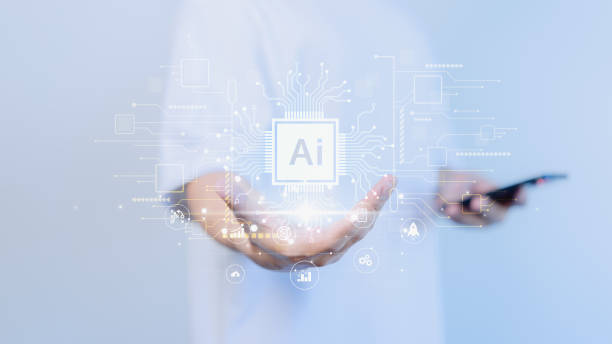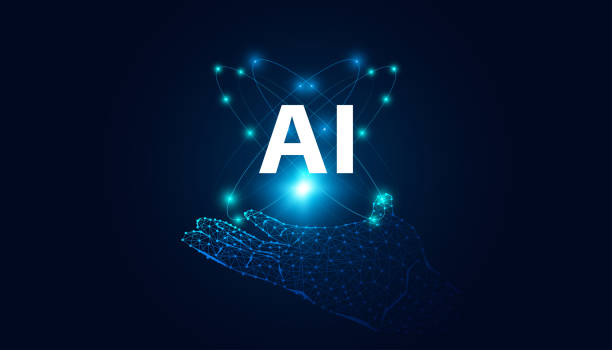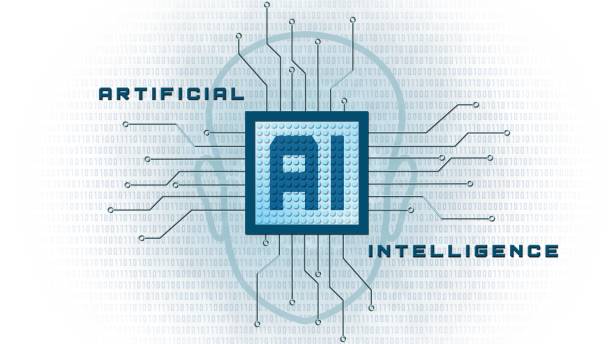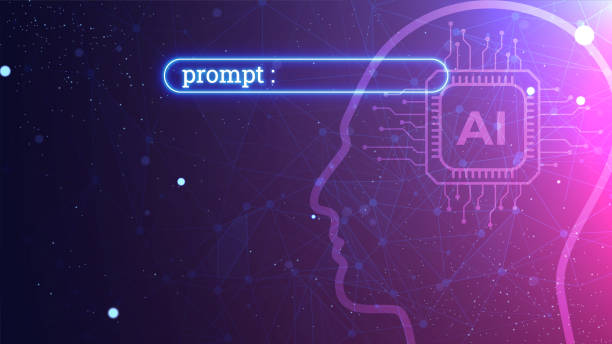1. AI in Your Pocket: Introducing Mobile AI Applications

Mobile AI applications are a new phenomenon that has been rapidly growing and evolving in recent years.
These applications, by leveraging #Artificial_Intelligence capabilities such as #Machine_Learning, #Natural_Language_Processing, and #Computer_Vision, provide unparalleled features for smartphone users.
From intelligent personal assistants to creative tools for image and video editing, the scope of this technology is vast.
The main goal of these applications is to increase efficiency, improve user experience, and provide automated solutions for daily problems.
Portable AI software can perform tasks that previously required human intervention or more complex systems, including facial recognition, real-time translation, and even consultation in various fields.
These advancements have not only made our lives easier but have also opened new doors to innovation and creativity.
This phenomenon is, in fact, the manifestation of AI’s power in a small, portable dimension, allowing everyone access to advanced technologies.
The high speed of mobile processors and the development of optimized algorithms for execution on limited devices have paved the way for the expansion of this technology.
Don’t have a company website yet and missing out on online opportunities? With professional company website design by Rasaweb,
✅ Double your business credibility
✅ Attract new customers
⚡ Free consultation for your company website!
2. Smart Platforms: The Architecture and Technology Behind Mobile AI Applications

Building a mobile AI application requires a deep understanding of software architecture and algorithm optimization for limited mobile environments.
The core of these applications is often based on machine learning models that either run locally on the device (Edge AI) or process data through connection to cloud servers.
The Edge AI approach means processing data directly on the device, which offers advantages such as higher speed, reduced data consumption, and greater privacy.
In contrast, cloud models provide access to very high processing power and vast databases but require a stable internet connection.
Developers use frameworks like TensorFlow Lite and ML Kit to implement AI models on iOS and Android.
These tools allow for converting complex models into lighter and more optimized formats for mobile.
Understanding how these models interact with device hardware, such as neural processing units (NPUs) embedded in many new phones, is essential for optimizing the performance of AI applications.
Furthermore, the importance of data collection and preprocessing, training models with high-quality data, and continuously evaluating their performance to ensure the accuracy and efficiency of AI applications on phones is vital.
These technical complexities indicate that developing a mobile AI application is not limited to just writing code but involves a comprehensive process from model design to implementation and maintenance.
3. A World of Possibilities: Diverse Applications of Mobile AI

Mobile AI applications cover a wide range of uses that have dramatically transformed our daily lives.
In the #Health sector, there are programs that can analyze disease symptoms based on user input, provide medication reminders, or even identify suspicious skin changes using the phone’s camera.
In the field of #Education, AI-powered applications can personalize educational content, answer students’ questions, and even enhance language skills through intelligent interactions.
For entertainment, creative content generation apps, augmented reality filters, and games with intelligent characters are prominent examples.
These programs push the boundaries of creativity and provide new experiences for users.
Also, in businesses, mobile AI tools significantly improve efficiency, project management, and customer communication.
From voice assistants for scheduling meetings to automated tools for administrative tasks, these applications increase productivity.
Mobile AI tools are influential not only in personal aspects but also in social and professional dimensions and have great potential for solving complex problems.
In fact, these applications are not just intelligent assistants but are, in a way, extensions of human capabilities, providing new opportunities for interacting with technology and the surrounding environment.
| Category | Examples | AI Features |
|---|---|---|
| Personal Assistants | Siri, Google Assistant, Cortana | Natural Language Processing, Speech Recognition, Answering Questions |
| Image and Video Editing | FaceApp, Lensa, Snapseed (smart features) | Computer Vision, Automatic Enhancement, Artistic Style Transfer |
| Health and Wellness | Fitness Tracking Apps, Early Symptom Detection | Sensor Data Analysis, Pattern Recognition, Prediction |
| Translation and Language | Google Translate, Microsoft Translator | Neural Machine Translation, Language Detection, Speech Translation |
4. Challenges and Limitations: A Look at the Obstacles Facing AI in Mobile

Despite all the countless advantages and capabilities, AI technology in mobile also faces challenges and limitations.
One of the most important of these is battery consumption.
Running complex AI models requires significant processing power, which can quickly drain a phone’s battery.
This issue is particularly evident for applications that use heavy local processing.
Hardware limitations are another challenge; although modern smartphones have become more powerful, they still have limited processing power and memory compared to cloud servers or desktop computers.
The issue of data privacy and security is also a serious concern for users, especially when applications require access to sensitive information.
Developers must ensure that data is processed and stored securely and that there is sufficient transparency regarding how data is used.
Questionable content and ethical challenges also arise, for example, the accuracy of detection in the health sector or potential biases in algorithms.
Additionally, the need for continuous updates of models and algorithms to maintain accuracy and efficiency increases maintenance costs and complexities.
These limitations show that despite significant advancements, the path of developing mobile AI applications is still long and requires more innovations to overcome these obstacles.
Are you frustrated by the low conversion rate of your e-commerce site? Rasaweb transforms your e-commerce site into a powerful tool for attracting and converting customers!
✅ Significantly increase visitor-to-buyer conversion rates
✅ Provide an exceptional user experience to boost customer satisfaction and loyalty⚡ Get a free consultation from Rasaweb!
5. The Future in Your Hands: Upcoming Trends in Mobile AI Applications

The future of mobile AI applications is very bright and full of potential.
One of the key trends is the advancement in Edge AI, which means processing AI entirely or mostly on the mobile device itself, without the need to send data to the cloud.
This not only increases response speed but also reduces data consumption and improves security and privacy.
With the development of more powerful and optimized chipsets for AI in smartphones, we will see more complex models running locally.
Another trend is deeper personalization and adaptation of AI applications on phones to each user’s unique needs.
Applications will be able to provide completely personalized experiences not only based on explicit user data but also by analyzing behavioral patterns and unconscious preferences.
Federated Learning will also play a significant role as a novel approach to training AI models without needing to collect sensitive user data in a central location.
This method ensures privacy and allows for continuous improvement of models.
These developments show that mobile AI tools are not only becoming smarter but will also transform into confidential and personalized tools that seamlessly integrate with our lives and are constantly learning and adapting to our needs.
6. Guide to Choosing the Best Mobile AI Application for You

Choosing the best mobile AI application for your needs can be confusing, as their variety is immense.
The first step is to identify your needs.
Are you looking for a tool to improve productivity, or an application for entertainment and creativity? Or perhaps you are looking for an assistant for health and fitness? After clarifying your needs, look for applications specifically designed for that purpose.
For example, if you are looking for AI photo editing, look for applications based on strong computer vision.
The next step is to check user reviews and ratings in app stores.
These reviews can provide valuable information about the app’s stability, ease of use, and effectiveness.
Also pay attention to security and privacy; always read the app’s privacy policy and ensure your information is processed securely.
Also, pay attention to the app’s offline capabilities.
Some AI applications on phones require a constant internet connection to function fully, while others can be processed locally, which is useful for areas with poor internet or for saving data.
Update capabilities and developer support are also important, as they indicate that the app is constantly being improved and bugs are being fixed.
By considering these tips, you can choose the best mobile AI tools that suit your lifestyle and needs.
7. Transforming Daily Life: The Impact of Mobile AI Applications on Modern Life

Mobile AI applications are no longer just luxury tools; they have become an integral part of our daily lives.
These applications are constantly changing and improving our interaction with technology and our environment.
From waking up with a smart alarm that determines the best wake-up time based on our sleep patterns, to navigating with real-time traffic and suggesting restaurants based on our taste, AI accompanies us every step of the way.
In the workplace, portable AI software has increased productivity; tools for organizing emails, summarizing long documents, and even assisting with writing and content creation save a lot of time.
At home, they can help manage smart devices, schedule daily tasks, and even suggest recipes based on ingredients available in the refrigerator.
These changes not only mean more convenience but also allow for tasks previously unimaginable and provide us with more free time.
An analysis of these changes shows that AI in mobile allows us to live smarter and interact with our environment in new ways.
| Aspect of Life | Example Impact | Related Content |
|---|---|---|
| Personal Productivity | Smart time management, virtual assistants, text summarizers | Explanatory, Guidance |
| Health and Wellness | Activity tracking, health advice, early disease detection | Specialized, News |
| Entertainment and Creativity | Music/art generation, AR filters, smart games | Entertaining, Analytical |
| Education and Learning | Language learning, personalized education, study assistance | Educational, Guidance |
8. Responsibility in the Age of AI: Ethics and Privacy in Mobile Applications

As mobile AI applications become more deeply integrated into our lives, the importance of ethical and privacy issues also increases.
Many of these applications require access to a large volume of personal data, from location and contact information to images and activity histories, to function correctly.
This raises serious concerns about how this data is collected, stored, and used.
Privacy protection for users and transparency regarding data policies are fundamental responsibilities of developers.
Furthermore, questionable content and ethical challenges related to AI, such as biases in algorithms or the possibility of misuse of technology, require special attention.
A mobile AI application must be designed to be fair, transparent, and trustworthy.
This means developing algorithms that are free from discrimination and whose results are explainable and understandable.
Also, users must have complete control over their data and be able to easily manage access.
Educating users about the risks and benefits of AI and encouraging them to make informed decisions about using this technology is a crucial step towards responsibility in the age of AI.
These issues are an inseparable part of the sustainable and ethical development of AI technology.
Are you bothered by losing customers who visit your site to make a purchase?
Rasaweb is your specialized solution for a successful online store.
✅ Significantly increase your online sales
✅ Build trust and professional branding with customers⚡ Get a free consultation from Rasaweb experts!
9. From Idea to Execution: A Guide to Developing Mobile AI Applications

Developing a mobile AI application is a complex and multi-stage process that requires specialized knowledge in both mobile development and artificial intelligence.
The first step is a precise definition of the problem and user needs.
What problem is this application supposed to solve and what value does it offer to users? After that, data collection and preparation are performed.
The quality and quantity of data are of high importance for training AI models.
The next stage involves designing and training the AI model.
This stage can include selecting the model type (such as neural networks, decision trees, etc.), model architecture, and parameter optimization.
After training, the model must be optimized for execution on the mobile device.
This optimization includes reducing model size, minimizing memory consumption, and optimizing for execution speed.
Frameworks like TensorFlow Lite or ML Kit are very useful in this stage.
Then it’s time to develop the user interface (UI) and user experience (UX) so that portable AI software is easy to use.
Continuous testing and evaluation are also essential to ensure the program’s correct and accurate performance and to fix bugs.
Finally, after launch, collecting user feedback and regular updates to improve and add new features are of high importance.
This cyclical process enables the growth and evolution of mobile AI tools.
10. Beyond a Tool: Mobile AI as the Driving Force of the Future

Ultimately, mobile AI applications are more than just a collection of code and algorithms; they are the driving force of major changes in how we live, work, and interact with the world.
These technologies, once seen only in science fiction movies, are now in the hands of millions and are constantly advancing.
From facilitating daily tasks to providing personalized health services and transforming the field of education, the potential of these applications is boundless.
Given recent advancements in mobile hardware and AI algorithms, it can be expected that in the near future, AI applications on phones will become even smarter, faster, and more integrated into our lives.
The challenges ahead, such as privacy issues, energy consumption, and algorithmic biases, require innovative approaches and collaboration between developers, policymakers, and users.
But by continuing this development trend and paying attention to ethical aspects, AI technology in mobile will not only help us perform our tasks better but also enable us to connect with the world around us in new and creative ways.
This revolution is in our hands, a revolution that gets smarter every day and promises a future full of unparalleled possibilities.
Frequently Asked Questions
| Question | Answer |
|---|---|
| What is a mobile AI application? | It is software that uses artificial intelligence technologies (such as machine learning, natural language processing, computer vision) on a mobile device to perform tasks, personalize user experience, or automate processes. |
| Name a few examples of these applications. | Voice assistants (like Siri, Google Assistant), facial recognition apps, smart keyboards, AI-powered photo editors, and translation applications. |
| What are the benefits of mobile AI applications? | Enhanced user experience, personalized services, task automation, improved accessibility, and offline capabilities for some AI features. |
| What are the challenges in developing these applications? | Limitations of processing power and battery life of mobile devices, data privacy concerns, optimizing the size of AI models, and the need for continuous updates. |
| How do these applications process data (on-device or cloud)? | Some process locally (on-device) for speed and privacy, others send data to the cloud for processing, and often a hybrid approach is used. |
| What technologies are typically used in them? | Machine Learning (ML), Deep Learning (DL), Natural Language Processing (NLP), Computer Vision (CV), and Speech Recognition. |
| What impact do they have on daily life? | Simplifying tasks, improving communication, enhancing entertainment, providing personalized recommendations, and contributing to a smarter life. |
| What is “Edge AI” in the context of mobile? | It refers to running AI models directly on the mobile device (at the “edge” of the network) instead of sending data to a central cloud server. |
| What is the future trend for these applications? | More powerful on-device AI, deeper integration with Augmented Reality (AR), hyper-personalization, and greater emphasis on ethical AI and privacy. |
| Are mobile AI applications always online? | No, many modern applications use on-device AI for core functionalities, allowing them to work offline or with limited connectivity, although some features may require internet. |
And other advertising services of Rasaweb Advertising Agency
Smart Customer Journey Map: An innovative platform for improving online growth by optimizing key pages.
Smart Digital Branding: An effective tool for online growth with the help of attractive user interface design.
Smart Advertorial: Professional optimization for customer behavior analysis using precise audience targeting.
Smart Advertorial: A dedicated service for improving SEO ranking based on user experience customization.
Smart Website Development: A professional solution for increasing click-through rates focusing on intelligent data analysis.
And over hundreds of other services in the field of internet advertising, advertising consulting, and organizational solutions
Internet Advertising | Advertising Strategy | Advertorial
Sources
Future of Mobile AI and its Trends
Innovation in Mobile AI Applications
How AI Transforms Smartphones?
Impact of AI on Mobile App Development
? For a leap in your business in the digital world, Rasaweb Afarin is your strategic partner. By offering comprehensive digital marketing services, including SEO, professional social media management, and multilingual website design, we pave your path to online success. Join Rasaweb Afarin and make your online presence stronger than ever.
📍 Tehran, Mirdamad Street, next to Bank Markazi, Kazeroon South Alley, Ramin Alley No. 6



